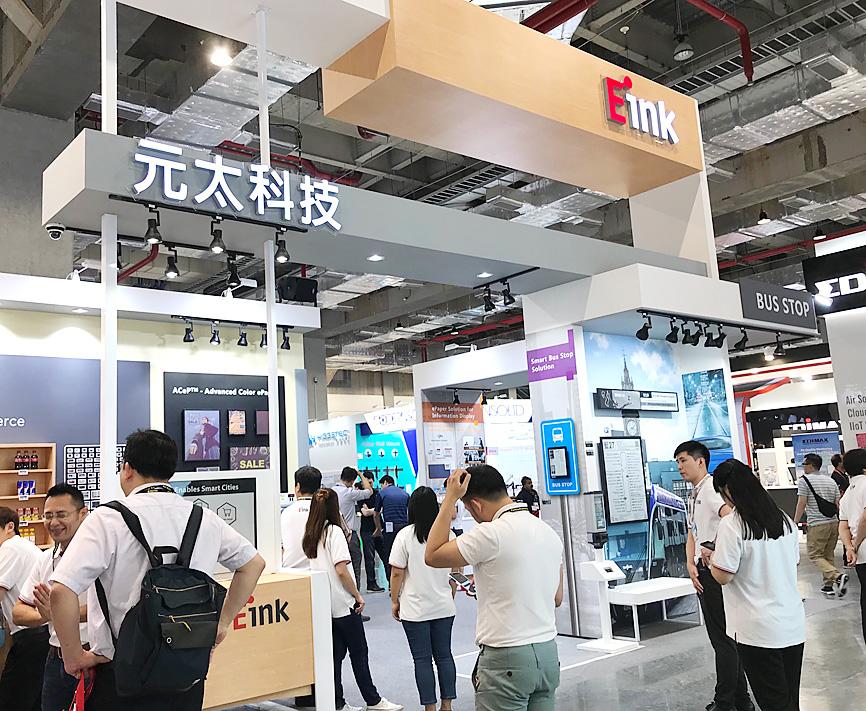E Ink Holdings Inc (元太科技), the world’s biggest e-paper display supplier, yesterday said revenue would continue to grow on an annual basis in the first half of the year, as large-scale retailers such as Walmart Inc are accelerating their adoption of electronic shelf labels (ESLs).
E ink said it is seeing rapidly growing demand for ESLs from hypermarkets in Europe, as retailers are motivated to push for store digitalization due to rising labor costs and a shortage of labor.
“We think higher inflation will boost ESL demand. We are seeing stronger demand and more companies are talking about installing ESLs in stores to cope with workforce reductions. Labor costs go up with inflation,” E Ink chairman Johnson Lee (李政昊) told an online investors’ conference in Taipei.

Photo: Chen Mei-ying, Taipei Times
SES-imagotag, an E Ink customer, earlier this month said that it has partnered with Walmart to digitize store shelves in all of the retailer’s outlets.
The company does not expect high inflation to reduce e-reader sales, Lee said, adding that inflation would likely stimulate sales as reading is a relatively inexpensive leisure activity.
“Demand is stronger than we would have imagined,” Lee said. “Demand is not our concern now. Our challenge is to increase the pace at which we’re expanding capacity.”
Revenue in the first two quarters of this year is expected to be higher than the NT$8.49 billion (US$297.36 million) recorded in the same period last year, E Ink chief financial officer Lloyd Chen (陳樂群) said.
Gross margin is also likely to rise in the January-to-June period, as a shortage of key components, such as chips and LCD displays, improved and they became cheaper, Chen said.
Gross margin stood at 45.58 percent in the first half of last year, company data showed.
To handle robust demand, E Ink said it would double capital expenditure to between NT$5 billion and NT$6 billion this year.
E Ink said it would this year launch four new production lines, which would increase capacity by 1.3 to 1.5 times.
The expansion is constrained by longer-than-expected lead times on equipment, it said.
E Ink said it is also in talks with its module partners to study the feasibility of building module assembly lines outside China, because revenue last month fell 5.42 percent year-on-year as COVID-19 restrictions in China closed its factory and its partners’ factories.
To fund capacity expansion, E Ink said it lowered its cash payout ratio this year to about 71 percent from 85 percent last year.
The company’s board of directors has approved the distribution of a cash dividend of NT$3.2 per common share.
E Ink’s earnings per share jumped about 43 percent to NT$4.53 last year, up from NT$3.18 in 2020.
Net profit for the whole of last year increased to NT$5.15 billion from NT$3.6 billion a year earlier.

MULTIFACETED: A task force has analyzed possible scenarios and created responses to assist domestic industries in dealing with US tariffs, the economics minister said The Executive Yuan is tomorrow to announce countermeasures to US President Donald Trump’s planned reciprocal tariffs, although the details of the plan would not be made public until Monday next week, Minister of Economic Affairs J.W. Kuo (郭智輝) said yesterday. The Cabinet established an economic and trade task force in November last year to deal with US trade and tariff related issues, Kuo told reporters outside the legislature in Taipei. The task force has been analyzing and evaluating all kinds of scenarios to identify suitable responses and determine how best to assist domestic industries in managing the effects of Trump’s tariffs, he

In a small town in Paraguay, a showdown is brewing between traditional producers of yerba mate, a bitter herbal tea popular across South America, and miners of a shinier treasure: gold. A rush for the precious metal is pitting mate growers and indigenous groups against the expanding operations of small-scale miners who, until recently, were their neighbors, not nemeses. “They [the miners] have destroyed everything... The canals, springs, swamps,” said Vidal Britez, president of the Yerba Mate Producers’ Association of the town of Paso Yobai, about 210km east of capital Asuncion. “You can see the pollution from the dead fish.

TIGHT-LIPPED: UMC said it had no merger plans at the moment, after Nikkei Asia reported that the firm and GlobalFoundries were considering restarting merger talks United Microelectronics Corp (UMC, 聯電), the world’s No. 4 contract chipmaker, yesterday launched a new US$5 billion 12-inch chip factory in Singapore as part of its latest effort to diversify its manufacturing footprint amid growing geopolitical risks. The new factory, adjacent to UMC’s existing Singapore fab in the Pasir Res Wafer Fab Park, is scheduled to enter volume production next year, utilizing mature 22-nanometer and 28-nanometer process technologies, UMC said in a statement. The company plans to invest US$5 billion during the first phase of the new fab, which would have an installed capacity of 30,000 12-inch wafers per month, it said. The

Taiwan’s official purchasing managers’ index (PMI) last month rose 0.2 percentage points to 54.2, in a second consecutive month of expansion, thanks to front-loading demand intended to avoid potential US tariff hikes, the Chung-Hua Institution for Economic Research (CIER, 中華經濟研究院) said yesterday. While short-term demand appeared robust, uncertainties rose due to US President Donald Trump’s unpredictable trade policy, CIER president Lien Hsien-ming (連賢明) told a news conference in Taipei. Taiwan’s economy this year would be characterized by high-level fluctuations and the volatility would be wilder than most expect, Lien said Demand for electronics, particularly semiconductors, continues to benefit from US technology giants’ effort